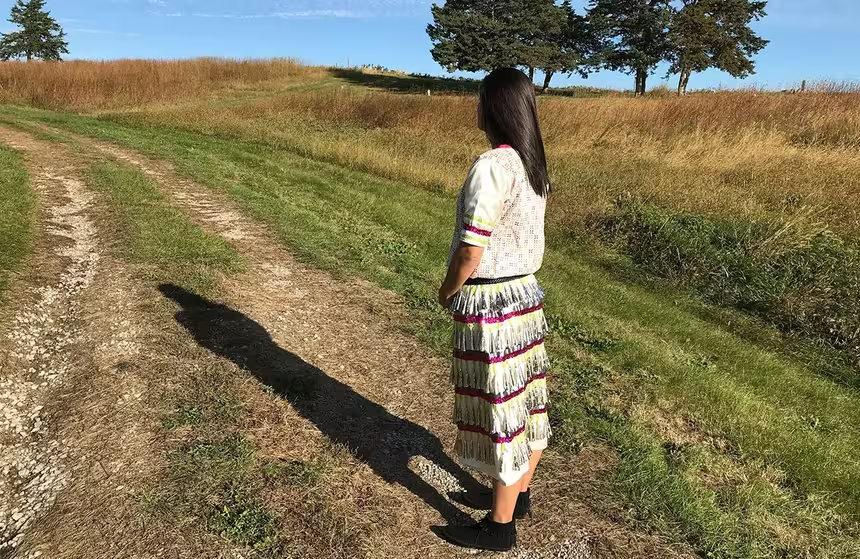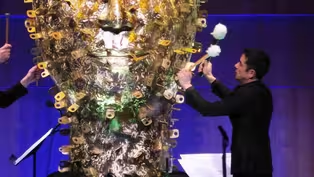
Land of My Fathers
Clip: Season 15 Episode 8 | 9m 41sVideo has Closed Captions
A Michigan transplant of Welsh descent explores Nebraska’s Welsh immigrant history.
Arthur Jones, a Nebraska transplant from Michigan, stumbles upon the small town of Wymore, where he excitedly discovers that its rich Welsh settlement history draws similar parallels between his own journey and those of the people who migrated from Wales to Wymore.
Problems playing video? | Closed Captioning Feedback
Problems playing video? | Closed Captioning Feedback
Nebraska Stories is a local public television program presented by Nebraska Public Media

Land of My Fathers
Clip: Season 15 Episode 8 | 9m 41sVideo has Closed Captions
Arthur Jones, a Nebraska transplant from Michigan, stumbles upon the small town of Wymore, where he excitedly discovers that its rich Welsh settlement history draws similar parallels between his own journey and those of the people who migrated from Wales to Wymore.
Problems playing video? | Closed Captioning Feedback
How to Watch Nebraska Stories
Nebraska Stories is available to stream on pbs.org and the free PBS App, available on iPhone, Apple TV, Android TV, Android smartphones, Amazon Fire TV, Amazon Fire Tablet, Roku, Samsung Smart TV, and Vizio.

Do you have a Nebraska Story?
Do you have a story that you think should be told on Nebraska Stories? Send an email with your story idea, your name, your city and an email address and/or phone number to nebraskastories@nebraskapublicmedia.org. Or, click the link below and submit your information on nebraskastories.org.Providing Support for PBS.org
Learn Moreabout PBS online sponsorship(gentle music) - [Narrator] Picking up your life and moving to a new place is a scary prospect.
(gentle music) In 2021, I moved from my home state of Michigan, 10 hours west to Lincoln, Nebraska.
(gentle music) I had never been to Nebraska before.
I was a stranger in a stranger place.
But as I made friends, learned where my new favorite food spots were (gentle music) and explored my new home state, my worries began to fade.
Rather than being nervous, I found excitement within this new frontier.
(gentle music) One such place I stumbled upon was the small town of Wymore, not 10 miles north of the Kansas/Nebraska border.
Wymore is known as the Welsh capital of the Great Plains.
Wymore more caught my attention because I myself have Welsh heritage.
Arthur Jones is a very Welsh name.
(gentle music) I knew I wanted to learn more.
Fortunately for me, Wymore is home to the Great Plains Welsh Heritage Center, who are more than willing to teach me about their town.
(gentle music) Robert Humphries, the director of the Great Plains Welsh Heritage Center and native of Wales came down from Wisconsin to show me around.
(gentle music) - Su'mae, Arthur.
- Robert, how's it going?
(Robert speaking in Welsh) (Robert speaking in Welsh) Wymore, Nebraska.
- What'd you say there?
Was that Welsh?
- That's right.
That's Welsh.
Or as we say in our language (speaking in Welsh).
And I just welcomed you to the Great Plains Welsh Heritage Center right here in Wymore, Nebraska.
- [Narrator] Robert chose to greet me in front of the large mural on the side of the Heritage Center.
- It symbolizes the journey of the Welsh to the Great Plains.
So on the right hand side, you see Wales on the eastern side of the Atlantic there with the mountains, and you see some people waving goodbye to their family members who have sailed for North America.
And then you see the prairies and farms, and of course, the iconic windmills of the Great Plains.
- [Narrator] Robert is a scholar of Welsh immigration to North America, but also has a wealth of knowledge about his home country.
Inside the Heritage Center lies one of the only archives within the United States, chronicling Welsh immigration to North America.
- This is (speaking in Welsh), the archive for Welsh America.
We have a lot of original documents, periodicals, manuscripts, and photographs.
And this is one of the most treasured artifacts here in our archive that speaks specifically to the experience of the Welsh here in Wymore.
Many of them made a promise that they would not consume alcohol or encourage others to drink alcohol.
You see the pledge in Welsh, and then it is followed by the names of the congregation.
(upbeat music) (upbeat music) - [Narrator] The other portion of the Heritage Center is the museum.
(upbeat music) The museum recounts the beginnings of what became the town of Wymore.
(upbeat music) The area was originally an Otoe and Missouri Tribe reservation, but these tribes were forcefully removed and sent south to Oklahoma to make room for the large influx of incoming settlers spurred by the cheap land promised by the Homestead Act.
(upbeat music) The settlers were primarily of Welsh, German and Czech descent.
(upbeat music) An enterprising man by the name of Samuel Wymore told the CBQ Railroad Company that they could build on the land he owned as long as they named the town after him.
(upbeat music) CBQ agreed, so Samuel Wymore donated the land, and the railroad began construction.
- My great-uncle came to begin with because he had been working in the slate mines in Vermont.
- [Narrator] Janey Williams Ruder is a longtime museum volunteer whose family settled here during the beginnings of Wymore.
- Then he came to buy land and have a farm here.
And my grandmother wrote and said, "My two sons, Isaac and Richard "would like to come to America.
"Could they live with you "and help you with the farm until they can find work?"
And this is the way a lot of people came.
- [Narrator] The museum is full of artifacts that people have donated over the years.
There are Welsh love spoons.
(upbeat music) In old Wales, these spoons were given to someone you wanted to marry.
The man would carve out an ornate spoon and include symbols that he felt represented the relationship.
(upbeat music) There are photos and documents from the Bethel Church, a culturally important place where the Welsh people of the town would often meet.
(upbeat music) (church bells ringing) The largest artifact can be found in Wymore's McCandless Park.
The restored Pleasant View one room schoolhouse began in the early 1900s and at first spoke only Welsh.
That soon changed with an influx of students who spoke other languages.
- I would say it was right after the first World War.
- Okay.
- You know, people said, we don't wanna be any different.
They just wanted to be Americans.
- [Arthur] Yeah.
- [Gwenith] So everything was translated into English.
- [Arthur] Yeah.
(gentle music) - [Narrator] Gwenith Closs-Colgrove, the President of the Great Plains Welsh Heritage Center was a student at the school.
She was part of the final class.
Her birthday was still up on the schedule.
- [Gwenith] She still has my birthday here.
- [Arthur] Oh, that's your birthday?
- [Gwenith] That's my birthday, December 22nd.
So it closed in 1960.
(gentle music) - [Narrator] She even remembered where her desk was.
- [Gwenith] I was in fifth grade, and this was my desk.
(gentle music) Now I can still fit in it, but it's a pretty tight fit, right?
But I remember this so well.
- [Narrator] Gwenith's father, also a student of the school, was a large reason that the Heritage Center was established.
- When they came to talk to my dad, who was the last Welsh speaker here, we thought what a wonderful history Wymore has.
And a part of that history of Wymore is the Welsh people that came here.
- [Narrator] The library within the Great Plains Welsh Heritage Center is named after Gwenith's father Ellsworth Closs.
(gentle music) Wymore, Nebraska is a place with a strong cultural foundation.
Because of people like Gwenith, Janey, and Robert.
The history of the Great Plains Welsh capital can be remembered.
Even more so, the history of Welsh immigration to the United States can be remembered.
(gentle music) This year, the North American Festival of Wales was held in Lincoln, Nebraska.
People flocked to Nebraska from around the country, continent, and even world.
- I've come to this festival for a number of years.
My family have Welsh heritage on my mother's side, and so I like to celebrate the Welsh heritage.
I enjoy singing, just the camaraderie.
- I've never been able to attend before, although I've wanted to because it's been further away and now it's only three hours from my hometown.
So I was able to drive.
(gentle music) - [Narrator] They had fresh made Welsh cakes, a tea time treat to eat alongside your hot cup of tea.
- Well, a Welsh cake, it's also sometimes called a tea cake or a baked stone, is pretty much a simple cross between a cookie and a scone.
- [Narrator] Even the kids present shared their excitement.
- We have a ton of Welsh flag mugs and stuff.
I have a mug with the the word (speaking in Welsh) (speaking Welsh) which is a small town in Wales.
- [Narrator] While sitting and enjoying my Welsh cakes and tea, taking everything in, I was transported out of the basement of a hotel into a place that tasted and sounded like home.
Yet this was a home I had never visited.
When talking to those attending, some were surprised that Nebraska would host the event.
- People were somewhat reluctant to, were saying Nebraska, how many Welsh people are there in Nebraska?
Well, we are discovering more and more how much Welsh there is here.
(gentle music) (wind rustling) (upbeat music) (upbeat music) - [Narrator] The opening ceremony for the festival was held within the Capitol building rotunda.
Gwenith welcomed everyone on behalf of the Great Plains Welsh Heritage Center.
- What a wonderful, wonderful audience we have today for this initial flag raising in our state capital.
This is the first time we've been honored to host the North American Festival of Wales in its nearly 100 year history.
(upbeat music) - [Narrator] The rotunda was full with people from Wales, Canada, and the United States.
I sat amongst a group from Alberta, Canada.
We were audience to speeches, poems and song.
(upbeat music) I found myself thinking about how my ancestors made their way to the US.
They were moving to carve out a new life, much like I was moving to begin a new job.
All those around me were in Lincoln, Nebraska this day because someone before them made the decision to move to a new place, to seek a new life.
It would've not been easy.
But according to an old Welsh adage, (speaking in Welsh) Ad-vid ah thoog wibod-eyth ah gwibod-eyth doy-theen-eb Adversity brings knowledge, and knowledge wisdom.
(choir music) (choir music)
Video has Closed Captions
Clip: S15 Ep8 | 8m 30s | The Omaha Symphony honors artists Ree and Jun Kaneko with a work by composer Andy Akiho. (8m 30s)
Providing Support for PBS.org
Learn Moreabout PBS online sponsorshipSupport for PBS provided by:
Nebraska Stories is a local public television program presented by Nebraska Public Media















